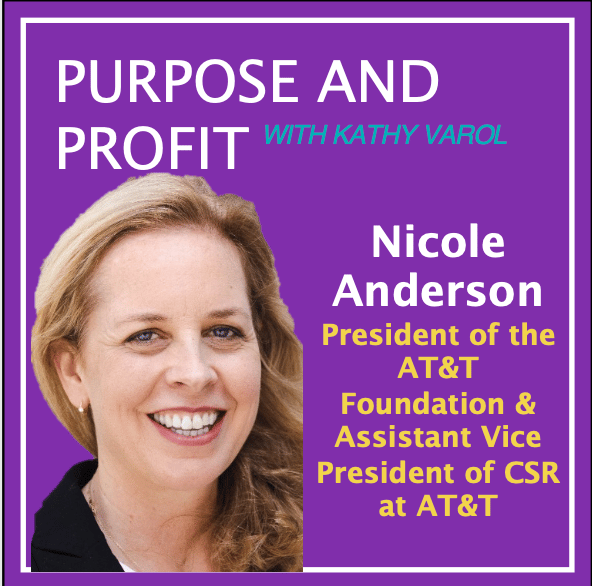Show Notes:
Nicole Anderson is the President of the AT&T Foundation and the Assistant Vice President of Corporate Social Responsibility at AT&T.
AT&T’s purpose is to “create connection—with each other, with what people need to thrive in their everyday lives and with the stories and experiences that matter” and their company ambition is to become the best broadband provider. In this episode, we dive into key focus areas of AT&T’s Environment, Social, and Governance (or ESG) strategy that support the company’s purpose—from their science-based climate targets to the $2 billion commitment through 2024 to help address the digital divide.
AT&T has received a number of third-party awards for its Diversity, Equity, and Inclusion culture including: DiversityInc’s “Top 50 companies for diversity” list, Bloomberg’s 2022 “Gender-Equality Index”, the Human Rights Campaign’s “Best Places to work for LGBTQ+ equality” with a 100% corporate equality index rating, and is ranked a top 10 Military Friendly employer with a longstanding commitment to supporting active military personnel, their families and veterans. AT&T surpassed its 2020 goal to hire 20,000 veterans.
In this episode we discuss:
- An innovative tool AT&T developed to mitigate climate risk for their company
- Lessons learned from the global pandemic that have informed AT&T’s ESG efforts
- A thoughtful example of using systems thinking to solve the digital divide
- The role that transparent ESG reporting plays in building trust and facilitating strategic partnerships
Key Takeaways:
- The importance of a focused ESG strategy that supports your corporate purpose and is integrated into your business strategy. Not only does this simplify the work that’s being done and enable greater impact, but this also helps create credibility around your efforts and the long-term commitment of the company. When employees and consumers can clearly see that the change you are trying to create makes sense from a business standpoint and compliments your business strategy, that change no longer comes across as an afterthought that might lose support over time.
- How critical it is to have science-based targets for sustainability efforts. Unfortunately, many companies’ targets are not science-based, which means even if their targets are achieved, they won’t hit the carbon reductions required to curtail our collective climate disaster. As you evaluate your company’s sustainability initiatives or the initiatives of the brands you support, check that their targets are science-based. If they aren’t, ask why, and how that can change.
- The importance of clearly defined ambitions, collaboration, and humility in creating what’s never been done before. Putting a man on the moon is a great example of the power of these 3 elements. When President JFK announced the ambition to land a man on the moon in 1962, he set the ambitious vision stating, “I believe that this nation should commit itself to achieving the goal, before this decade is out, of landing a man on the Moon and returning him safely to the Earth. No single space project…will be more exciting, or more impressive to mankind, or more important…and none will be so difficult or expensive to accomplish”. It was this ambitious goal that captured the nation’s imagination. Through humility and collaboration, in 1969, just 7 years after JFK’s speech, Neil Armstrong took his giant leap for mankind on the moon’s surface. So ask yourself, what are the moonshots in your industry that will spark collective imagination, passionate engagement, and lasting change?
References:
- Connect with Nicole on LinkedIn
- AT&T’s corporate social responsibility (CSR) page
- AT&T press release on the Connected Climate Initiative
- Read more about AT&T’s climate resilience program and Climate Change Analysis Tool (CCAT) here
- Connected Nation
- Affordable Connectivity Program
- The Achievery
- Argonne National Laboratory
- SBP disaster recovery organization
- SBP’s Equip App
- Global Reporting Initiative (GRI)
- Sustainability Accounting Standards Board (SASB)
- Task Force on Climate Related Financial Disclosures (TCFD)

